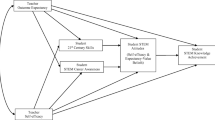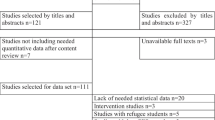Abstract
International studies have shown that interest in science and technology among primary and secondary school students in Western European countries is low and seems to be decreasing. In many countries outside Europe, and especially in developing countries, interest in science and technology remains strong. As part of the large-scale European Union funded ‘Science Education for Diversity’ project, a questionnaire probing potential reasons for this difference was completed by students in the UK, Netherlands, Turkey, Lebanon, India and Malaysia. This questionnaire sought information about favourite courses, extracurricular activities and views on the nature of science. Over 9,000 students aged mainly between 10 and 14 years completed the questionnaire. Results revealed that students in countries outside Western Europe showed a greater interest in school science, in careers related to science and in extracurricular activities related to science than did Western European students. Non-European students were also more likely to hold an empiricist view of the nature of science and to believe that science can solve many problems faced by the world. Multilevel analysis revealed a strong correlation between interest in science and having such a view of the Nature of Science.




Similar content being viewed by others
Notes
The term empiricist used here is almost interchangeable with the terms positivist and logicopositivist. Positivism and logicopositivism denote a more extreme position on the continuum and therefore have a negative connotation. Therefore, the more neutral term empiricist is used here. Empiricism does not only refer to the use of empiric evidence in science. In a similar way, the term relativism can be considered as a more extreme version of constructivism, which therefore also has a more negative connotation.
References
Abd-El-Khalick, F., & Lederman, N. G. (2000). Improving science teachers’ conceptions of nature of science: a critical review of the literature. International Journal of Science Education, 22, 665–701.
Aikenhead, G. S. (1997). Student views on the influence of culture on science. International Journal of Science Education, 19, 419–428.
Aikenhead, G. S., & Ryan, A. G. (1992). The development of a new instrument—views on science-technology-society (VOSTS). Science Education, 76, 477–491.
Akkerman, S., & van Eijck, M.W. (2013). Re-theorising the student dialogically across and between boundaries of multiple communities. British Educational Research Journal, 39, 60–72.
American Association for the Advancement of Science (1990). The liberal art of science: agenda for action. Washington, DC. American Association for the Advancement of Science (2009). The Nature of Science. Project 2061: Benchmarks Online. Retrieved from http://www.project2061.org/publications/bsl/online/index.php?chapter=1
Bennett, J., & Hogarth, S. (2009). Would you want to talk to a scientist at a party? High school students’ attitudes to school science and to science. International Journal of Science Education, 31, 1975–1998.
Bybee, R., & McCrae, B. (2011). Scientific literacy and student attitudes: perspectives from PISA 2006 science. International Journal of Science Education, 33, 7–26.
Deng, F., Chen, D. T., Tsai, C. C., & Chai, C. S. (2011). Students’ views of the nature of science: a critical review of research. Science Education, 95, 961–999.
Dogan, N., & Abd-El-Khalick, F. (2008). Turkish grade 10 students’ and science teachers’ conceptions of nature of science: a national study. Journal of Research in Science Teaching, 45, 1083–1112.
Eijkelhof, H. M. C., & Kortland, J. (1988). Broadening the aims of physics education. In P. J. Fensham (Ed.), Development and dilemmas in science education (pp. 282–305). London: Falmer Press.
Gago, J. M., Ziman, J., Caro, P., Constantinou, C., Davies, G., Parchman, I., Rannikmäe, I., & Sjøberg, S. (2004). Europe needs more scientists: report by the high level group on increasing human resources for science and technology in Europe. Retrieved from http://ec.europa.eu/research/conferences/2004/sciprof/pdf/final_en.pdf.
Hagay, G., Baram-Tsabari, A., Ametller, J., Cakmakci, G., Lopes, B., Moreira, A., et al. (2013). The generalizability of students’ interests in biology across gender, country and religion. Research in Science Education, 43, 895–919.
Jehng, J.-C., Johnson, S. D., & Anderson, R. C. (1993). Schooling and students’ epistemological beliefs and learning. Contemporary Educational Psychology, 18, 23–35.
Kang, S. J., Scharmann, L. C., & Noh, T. (2005). Examining students’ views on the nature of science: results from Korean 6th, 8th, and 10th graders. Science Education, 89, 314–334.
Kawasaki, K. (1996). The concepts of science in Japanese and Western education. Science & Education, 5, 1–20.
Kind, P., Jones, K., & Barmby, P. (2007). Developing attitudes towards science measures. International Journal of Science Education, 29, 871–893.
Lederman, N. G. (1992). Students’ and teachers’ conceptions about the nature of science: a review of the research. Journal of Research in Science Teaching, 29, 331–359.
Lederman, N. G., Abd-El-Khalick, F., Bell, R. L., & Schwartz, R. S. (2002). Views of nature of science questionnaire: toward valid and meaningful assessment of learners’ conceptions of nature of science. Journal of Research in Science Teaching, 39, 497–521.
Liu, S.-Y., & Lederman, N. (2002). Taiwanese gifted students’ views of nature of science. School Science and Mathematics, 102, 114–123.
Liu, S.-Y., & Tsai, C.-C. (2008). Differences in the scientific epistemological views of undergraduate students. International Journal of Science Education, 30, 1055–1073.
McComas, W. F., & Olson, J. (2002). The nature of science in international science education standards documents. In W. F. McComas (Ed.), The nature of science in science education: rationales and strategies (pp. 41–52). Dordrecht: Kluwer Academic Publishers.
McComas, W. F., Clough, M. P., & Almazroa, H. (2002). The role and character of the nature of science in science education. In W. F. McComas (Ed.), The nature of science in science education: rationales and strategies (pp. 3–39). Dordrecht: Kluwer Academic Publishers.
National Research Council. (2012). A Framework for K-12 science education: practices, crosscutting concepts and core ideas. Washington D.C.: The National Academies Press.
Organisation for Economic Co-operation and Development. (2007). PISA 2006: Science competencies for tomorrow’s world. Volume 1: Analysis. Retrieved from http://www.oecd-ilibrary.org/education/pisa-2006_9789264040014-en
Osborne, J., Simon, S., & Collins, S. (2003). Attitudes towards science: a review of the literature and its implications. International Journal of Science Education, 25, 1049–1079.
Rasbash, J., Charlton, C., Browne, W.J., Healy, M., & Cameron, B. (2005). MLwiN Version 2.02. Centre for Multilevel Modelling, University of Bristol.
Schommer-Aikins, M., Duell, O. K., & Barker, S. (2003). Epistemological beliefs across domains using Biglan’s classification of academic disciplines. Research in Higher Education, 44, 347–366.
Schreiner, C., & Sjøberg, S. (2010). Science education and young people’s identity construction—two mutually incompatible projects? In D. Corrigan, J. Dillon, & R. Gunstone (Eds.), Re-emergence of values in science curriculum (pp. 231–247). Rotterdam: Sense Publishers.
Sjøberg, S., & Schreiner, C. (2005a). The ROSE Project: an overview and key findings. Retrieved from http://www.roseproject.no/network/countries/norway/eng/nor-Sjoberg-Schreiner-overview-2010.pdf
Sjøberg, S., & Schreiner, C. (2005). How do learners in different cultures relate to science and technology? Asia-Pacific Forum on Science Learning and Teaching, 6(2), 1–17. Retrieved from http://www.ied.edu.hk/apfslt/.
Snijders, T. A. B., & Bosker, R. J. (1999). Multilevel analysis: an introduction to basic and advanced multilevel modeling. London: Sage.
Solomon, J. (1991). Teaching about the nature of science in the British national curriculum. Science Education, 75, 95–103.
Speering, W., & Rennie, L. (1996). Students’ perceptions about science: the impact of transition from primary to secondary school. Research in Science Education, 26, 283–298.
Acknowledgments
This publication received funding from the European Union Science in Society Framework 7 Programme (FP7/2007/2013) under grant agreement 244717. We would like to thank the following people for collecting data and contributing to this research project: Roel Janssen, Huseyin Bag, Lindsay Hetherington, Alun Morgan, Keith Postlethwaite, Rupert Wegerif, Ng Swee Chin, Choy Siew Chee, Oo Pou San, Chin Fui Chung, Teh Lee Wah, Sugra Chunawala, Chitra Natarajan and Beena Choksi.
Author information
Authors and Affiliations
Corresponding author
Rights and permissions
About this article
Cite this article
van Griethuijsen, R.A.L.F., van Eijck, M.W., Haste, H. et al. Global Patterns in Students’ Views of Science and Interest in Science. Res Sci Educ 45, 581–603 (2015). https://doi.org/10.1007/s11165-014-9438-6
Published:
Issue Date:
DOI: https://doi.org/10.1007/s11165-014-9438-6




